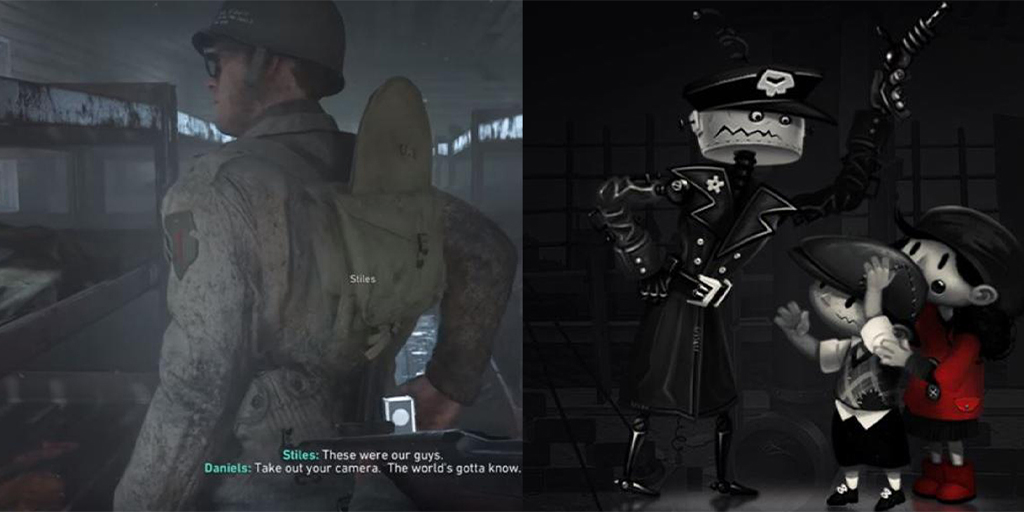
Playing the Holocaust – Part 1
On Friday 20th November, 137 participants gathered for what was an incredibly animated discussion about Holocaust memory and computer games. The session aimed to explore these and many more questions:
- Why is there so much hesitation about computer games and the role they might play in perpetuating Holocaust memory?
- Is this hesitation medium-specific, or does it repeat historical ‘media panics’?
- What are the specificities of computer games, and other game formats?
- How might they add something to the Holocaust memoryscape?
- Are games and play the same thing? Do games necessitate ‘role-playing’?
- To what extent can computer games give users agency as memory (co)-producers?
- How might games and play contribute productively to Holocaust memory?
Recordings of the speakers’ presentations and their answers to some of the questions asked by participants can be viewed in the videos below. We apologise that for some reason, the Q&A videos were not captured by Zoom, nevertheless, you can still hear the answers. Points and links highlighted in the chat have also been included at the end of this post.

Dr. Victoria Grace Walden is a Senior Lecturer in Media Studies at the University of Sussex and curator of this website. Her research focuses on Holocaust memory and media. Her first book on this topic was Cinematic Intermedialities and Contemporary Holocaust Memory (Palgrave Macmillan 2019). She has since focused particularly on digital Holocaust memory in several published and forthcoming academic publications. She started the session with some contextualisation about Holocaust memory, play, and games, and introduced some questions for further discussion.
#

Professor Wulf Kansteiner is Professor of History at Aarhus University. He is a cultural historian, historical theorist, and memory studies scholar. His research focuses on cultural memories in film, television, and digital culture; the narrative structures of historical writing; and the methods and theories of memory studies. He is co-editor of the Sage-Journal Memory Studies. He offered a wide contextual view of the place of computer games and immersion in memory culture, and reflected upon the place of Holocaust memory in contemporary memory politics.
#

Kate Marrison is a PhD researcher at the University of Leeds exploring the preservation of Holocaust memory in digital culture. Her project titled Digital Witness: The Experiential Turn in Holocaust Memory takes an interdisciplinary approach to consider multiple case studies including video games, virtual reality and interactive testimony. Kate is also a research assistant on the AHRC funded project Virtual Holocaust Memoryscapes. She explored the tensions of playability in Call of Duty: World War II.

Tabea Widmann is a doctoral student at the University of Konstanz, Germany. Her dissertation project The Game is the Memory: A Memory Cultural Analysis of Prosthetic Witnesses of the Holocaust in Digital Games (working title) focuses on digital games as memory media and concepts of medialized testimony. She spoke about computer games in relation to responsibility and witnessing.

Pieter Van den Heede is a PhD Candidate at the Department of History of Erasmus University Rotterdam. He studies how digital games allow for engagements with the Second World War. His research is part of the REI project “War! Popular Culture and European Heritage of Major Armed Conflicts”. He discussed audience responses to Call of Duty: WWII.
The Discussion
As always, there was a very lively discussion in the chat and during the Q&A session. These audio recordings capture the panel’s responses to questions. Links and other ideas from the chat are summarised below. Apologises again for Zoom not capturing the video here.
Chat and Further Links
Participants joined us from across the world, including Australia, Romania, the US, India, the Netherlands, Israel, Argentina, the Philippines, the UK, Turkey, Germany, Finland, Austria, France, Russia, Sweden, Canada, Saudi Arabia, Taiwan, Serbia, Cyprus, Denmark and Poland (and that was just those who introduced themselves in the chat!).
The padlet, which participants were welcomed to contribute to can be viewed here. Some useful resources were also collected here. for those interested in exploring the topic further.
Links Shared in the Chat
A paper by Bonnie Ruberg about games and ‘being in others’ shoes’
A link to the Pitch Jam project, trying to bring together historians, institutions of remembrance, and game developers
There was a lot of discussion about ways to connect external historical material to the playable environments of games. Some comments considered models based on the Civilopedia of Civilization or the discover tour mode of Assassin’s Creed
Explore the Holocaust and occupation in computer games:
Don’t Starve (and ‘Holocaust’ mod)
Wolfenstein ‘Sonderkommando Revolt’ mod
Feel free to share more links and examples below!
Part II of our ‘Playing the Holocaust’ followed this event, in February 2021. This online discussion focused on the experiences of game makers.